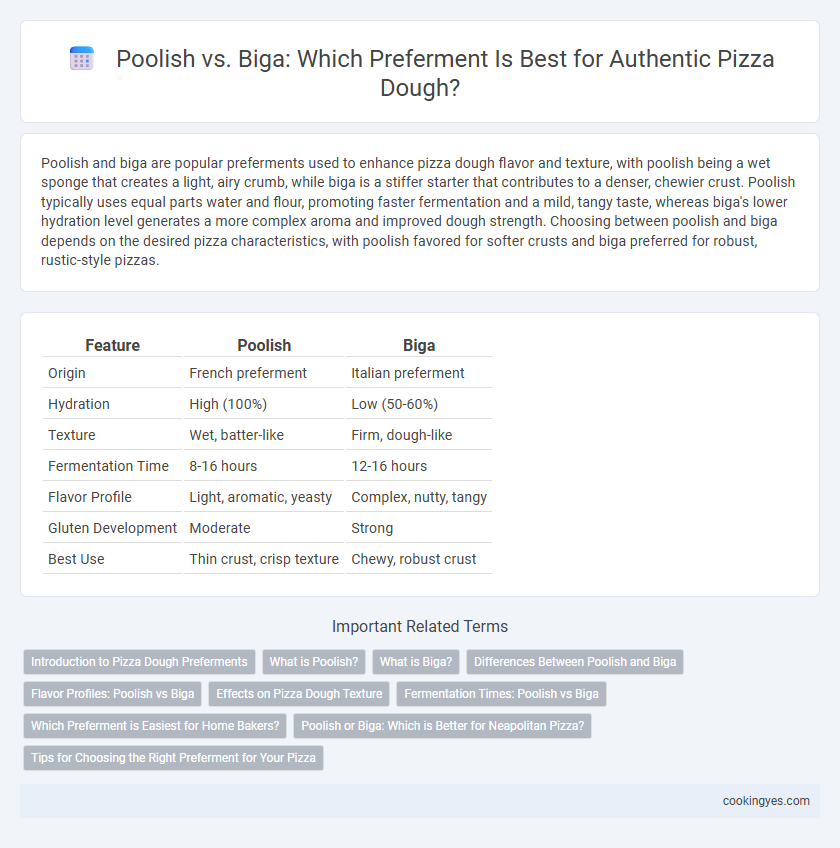Poolish and biga are popular preferments used to enhance pizza dough flavor and texture, with poolish being a wet sponge that creates a light, airy crumb, while biga is a stiffer starter that contributes to a denser, chewier crust. Poolish typically uses equal parts water and flour, promoting faster fermentation and a mild, tangy taste, whereas biga's lower hydration level generates a more complex aroma and improved dough strength. Choosing between poolish and biga depends on the desired pizza characteristics, with poolish favored for softer crusts and biga preferred for robust, rustic-style pizzas.
Table of Comparison
| Feature | Poolish | Biga |
|---|---|---|
| Origin | French preferment | Italian preferment |
| Hydration | High (100%) | Low (50-60%) |
| Texture | Wet, batter-like | Firm, dough-like |
| Fermentation Time | 8-16 hours | 12-16 hours |
| Flavor Profile | Light, aromatic, yeasty | Complex, nutty, tangy |
| Gluten Development | Moderate | Strong |
| Best Use | Thin crust, crisp texture | Chewy, robust crust |
Introduction to Pizza Dough Preferments
Poolish and biga are traditional pizza dough preferments that enhance flavor, texture, and fermentation control. Poolish is a wet, sponge-like mixture with equal parts water and flour, promoting a light, airy crumb and subtle tanginess. Biga, originating from Italy, has a stiffer consistency with less hydration, resulting in a denser crust and pronounced nutty flavor.
What is Poolish?
Poolish is a type of preferment used in pizza dough making, characterized by a wet consistency with equal parts flour and water combined with a small amount of yeast. It ferments for several hours, developing flavor and improving dough extensibility, which contributes to a lighter, airier crust. Popular in French and Polish baking traditions, poolish enhances the taste and texture of Neapolitan-style pizza dough by promoting natural yeast activity.
What is Biga?
Biga is an Italian preferment used in pizza dough preparation, characterized by its stiff, dry texture and longer fermentation time. It enhances dough strength, flavor complexity, and crumb structure by promoting optimal yeast activity and gluten development. In comparison to poolish, biga offers a more robust, nutty taste and a chewier crust, favored in traditional Neapolitan-style pizzas.
Differences Between Poolish and Biga
Poolish and biga are both preferments used to enhance pizza dough flavor and texture through fermentation, but poolish is a wet, batter-like mixture with equal parts water and flour, while biga is a stiffer, drier dough with less hydration. Poolish ferments more quickly due to its higher hydration, resulting in a more open crumb and tangy flavor, whereas biga develops more gluten structure, contributing to a chewier texture and subtle nutty notes. Bakers often choose poolish for softer, airier crusts and biga for firmer, more elastic dough ideal for traditional Italian-style pizzas.
Flavor Profiles: Poolish vs Biga
Poolish imparts a mild, slightly tangy flavor with a lighter crumb and enhanced yeast aroma, ideal for a balanced pizza crust. Biga develops a more complex, nutty flavor and chewier texture due to its stiff consistency and longer fermentation. Both preferments enrich dough flavor, but poolish emphasizes subtle acidity while biga emphasizes depth and robustness.
Effects on Pizza Dough Texture
Poolish enhances pizza dough texture by creating a lighter, airier crumb with a delicate crispness due to its higher hydration and fermentation time. Biga produces a firmer, chewier crust characterized by a denser crumb and more complex flavor, attributed to its lower hydration and longer fermentation period. Both preferments improve gluten development and dough extensibility, but Poolish provides a softer dough while Biga results in a more structured and resilient crust.
Fermentation Times: Poolish vs Biga
Poolish typically ferments for 12 to 16 hours at room temperature, producing a highly active and bubbly starter that contributes to a lighter crust with open crumb structure. Biga fermentation ranges from 16 to 24 hours, resulting in a denser dough with more complex nutty and sour flavor notes due to its longer, slower fermentation. The choice between poolish and biga fermentation times directly influences the dough's texture, flavor, and extensibility, critical for achieving authentic pizza crust characteristics.
Which Preferment is Easiest for Home Bakers?
Poolish is the easiest preferment for home bakers due to its high hydration and simple mixing process, requiring equal parts flour and water with a small amount of yeast. It ferments quickly at room temperature, making it more forgiving and suitable for beginners compared to biga. Biga, being stiffer with lower hydration, demands more precise handling and longer fermentation, which can be challenging for home environments.
Poolish or Biga: Which is Better for Neapolitan Pizza?
Poolish offers a wetter consistency that enhances gluten development and imparts a slightly tangy flavor, ideal for a light, airy Neapolitan pizza crust. Biga, with its drier texture, provides a denser dough and more complex aroma, contributing to a chewier bite and deeper flavor profile preferred in traditional Neapolitan pizzas. Choosing between poolish and biga depends on the desired crust texture and fermentation time, but many pizzaiolos favor biga for its authenticity in Neapolitan pizza making.
Tips for Choosing the Right Preferment for Your Pizza
Poolish offers a wetter, more aerated dough ideal for light, airy crusts, while biga provides a stiffer preferment that enhances dough elasticity and flavor complexity. When choosing the right preferment, consider your desired crust texture and fermentation time; poolish ferments faster and suits thin-crust pizzas, whereas biga benefits slow fermentation for a chewier bite. Adjust hydration levels accordingly to maintain dough consistency and optimize gluten development with each preferment method.
Poolish vs Biga for pizza dough preferment Infographic

 cookingyes.com
cookingyes.com